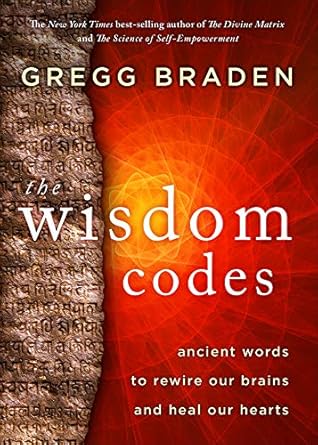More on this book
Community
Kindle Notes & Highlights
by
Gregg Braden
Read between
November 14 - December 29, 2022
The implications of the word-life relationship are profound. It appears that the language we use—the words we choose to describe ourselves and share our thoughts, feelings, emotions, and beliefs—actually forms the framework for the unity or separation that we experience when we think and solve the problems of everyday life.
For example, while we commonly think of anger, jealousy, and criticism as separate issues to be dealt with one by one, each ultimately points to the same core issue: unresolved fear. By healing (resolving) our underlying fear, we dismantle the need for safety and the reasons why varied expressions of the same fear may be showing up in our lives.
“What you have seen is what we do to create the feeling in our bodies. The feeling is the prayer, and the words create the feeling!”
“Ask without hidden motive and be surrounded by your answer. Be enveloped by what you desire so that your joy may be full.”
Within the context of alcoholic dysfunction, children and spouses frequently report feelings of being ignored, criticized, and discounted. If the family member is not anchored in a strong sense of self, with healthy self-esteem and a strong soul identity, it’s easy for them to become lost
and succumb to the feelings they experience. In the absence of a clear identity, they may believe the demeaning views that they experience in their unhealthy environment.
If we allow the hurt of our trauma to linger unresolved, that hurt can destroy us. It can destroy our health, our relationships, and, in so many ways, our lives. If, on the other hand, we can find the strength to love in the presence of our deepest hurts, we can give new meaning to life’s most painful experiences. In doing so, we become better versions of ourselves.
We are more healed, more present for our families, and stronger members of our communities. It’s all about the choice we make to love in the presence of our hurt.
The 13th-century Sufi poet Jalāl ad-Dīn ar-Rūmī, known simply as Rumi, beautifully summarized our relationship to this universal force: Your task is not to seek for love, but merely to seek and find
all the barriers within yourself that you have built against it.
The more we allow love to heal the hurt in our lives, the more we discover the depth of our capacity to love ourselves, as well as other people.
In the Gospel of Thomas, for example, the author describes the power of love as part of a discourse from the
master teacher Jesus: “Blessed is the man who has suffered, and found life.” In another portion of the same teaching, Jesus states: “That which you have will save you if you bring it forth from yourselves.”
And as we allow ourselves to feel, rather than trying to mask or deny our feelings, we discover our capacity for love. Simply put, hurt is the price that we sometimes pay to discover that we already have the love we need to heal ourselves.
And perhaps most importantly, forgiveness isn’t for the person that you are forgiving. It’s for you. Forgiveness is an act of love that you perform for yourself.
Brandt describes forgiveness beautifully, stating, “By forgiving, you are accepting the reality of what happened and finding a way to live in a state of resolution with it.”
If you bring forth what is within you, what you bring forth will save you. If you do not bring forth what is within you, what you do not bring forth will destroy you.
If I bring forth what is within me, what I bring forth will save me.
When we look at the everyday expression of our spiritual and material abundance, our relationships, careers, and physical health, our deepest loves and greatest achievements, as well as our fears and the lack of all of these things, we may, in fact, be looking squarely at the mirror of our truest and sometimes most unconscious beliefs. We see them in our surroundings because they are made manifest through a Field of energy that exists everywhere, at all times, and connects all things.


